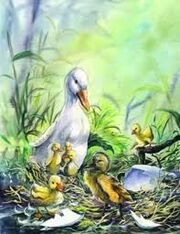Reference to Hans Christian Anderson, author and poet. Anderson is famous for his children’s pieces, including The Little Mermaid, The Princess and the Pea, and-- most important in terms of Wallace Stevens connections, The Ugly Duckling. Anderson was born in Denmark in 1805 and was exposed to The Arabian Nights by his father, who died in 1816. Anderson attended various primary schools for poverty stricken families and had to support himself financially, working as both a weaving apprentice and a tailor. When he was 14, he moved and began acting in theatre in Copenhagen but was let go when his voice changed. He was told he was better suited to be a poet. He was sent to grammar school by a theatre director, but he later recounted these years as the darkest in his life. He later traveled throughout Europe while writing fairy tales, travelogues, and poetry. He died of liver cancer in 1875.
Sonatina To Hans Christian[]
If any duck in any brook,
Fluttering the water
For your crumb,
Seemed the helpless daughter
Of a mother
Regretful that she bore her;
Or of another,
Barren, and longing for her;
What of the dove,
Or thrush, or any singing mysteries?
What of the trees
And intonations of the trees?
What of the night
That lights and dims the stars?
Do you know, Hans Christian,
Now that you see the night?
Critical Voices:[]
Critic George S. Lensing links Stevens’s poem “Sonatina to Hans Christian” to Anderson’s tale of The Ugly Duckling and provides a close reading of the poem (Wallace Stevens: A Poet’s Growth, 1986).
Thomas Lombardi applies a biographical lens to the same poem and claims that ducks and other birds represent Margaretha, Mary Katherine, Elizabeth, and Wallace Stevens himself.
References:[]
- Lensing, George S. Wallace Stevens: A Poet’s Growth. 1986. Google Books. Web.
- Lombardi, Thomas F. Wallace Stevens and the Pennsylvania Keystone. Cranbury: Associated UP, 1996. Google Books. Web.

Ugly Duckling